Stage 1 – Reporting a Concern
- 4.1 Who can Report a Concern?
- 4.2 Police Engagement
- 4.3 Guidance for Organisations
- 4.4 Guidance for Employees and Volunteers
- 4.5 In an Emergency or Out of Hours
- 4.6 Whistleblowing – Public Interest Disclosure Act 1998
- 4.7 Role of the Safeguarding Concerns Manager
- 4.8 Gather Information
- 4.9 Take Action to Ensure the Immediate Safety of the Adult at Risk
- 4.10 Deciding Whether to Report an Incident to the Police
- 4.11 Preserving Evidence
- 4.12 Deciding Whether to Raise a Safeguarding Concern
- 4.13 Mental Capacity to Consent
- 4.14 Raising a Safeguarding Concern without the Consent of the Adult at Risk
- 4.15 Document the Incident and any Actions or Decisions Taken
- 4.16 Ensure Key People are Informed
- 4.17 Provide Support for the Person Raising the Concern
- 4.18 Issues and Concerns regarding Service Provision
- 4.19 How to Raise a Safeguarding Concern
Section 4: Stage 1 – Reporting a Concern
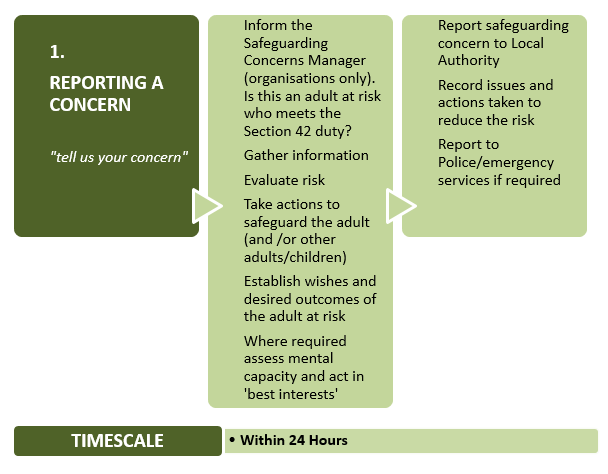
An ‘adult at risk’ is described on page (i) of this document.
An adult safeguarding concern is any worry about an adult who has or appears to have care and support needs that they may be subject to, or may be at risk of, abuse or neglect and may be unable to protect themselves against this.
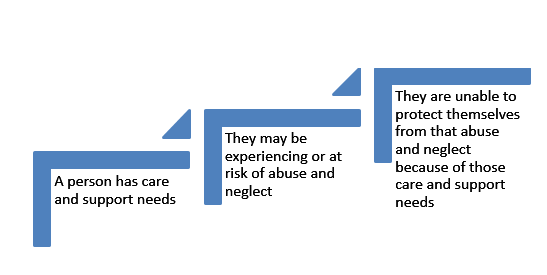
Unpaid carers will sometimes have care and support needs of their own. However, sometimes unpaid carers will only have support needs. In these circumstances this policy and procedures may still be used as a proportionate response to the concerns where appropriate, using its duty to promote wellbeing. This may be appropriate, for example, if an unpaid carer experiences intentional or unintentional harm from the adult they are trying to support.
Concerns should be reported to the local authority in the area where the abuse is happening. See Section 5.19 for contact details.
Abuse and neglect often involve the actions of one person towards another. However, self-neglect involves situations where a person is placing themselves at risk of harm. This could be due to their reluctance, or inability to accept the assistance they need with their care and support needs. For more information about self-neglect see Section 2.26 of the policy.
4.1 Who can Report a Concern?
Any person who has concerns that someone who has, or may have care and support needs is experiencing, or is at risk of abuse and neglect, can raise their concerns with the local authority.
This means that the adult experiencing abuse or neglect can raise their concerns themselves, but so can their friends, family members, unpaid carers, other members of the public, paid carers, professionals and organisations.
A concern can be:
- An active disclosure of abuse by the adult, where the adult tells a member of staff that they are experiencing abuse and/or neglect;
- A passive disclosure of abuse where someone has noticed signs of abuse or neglect, for example clinical staff who notice unexplained injuries;
- An allegation of abuse by a third party, for example a family/friend or neighbour who have observed abuse or neglect or have been told of it by the adult;
- A complaint or concern raised by an adult or a third party who doesn’t perceive that it is abuse or neglect. Complaints Officers should consider whether there are safeguarding matters;
- A concern raised by staff or volunteers, others using the service, a carer or a member of the public;
- An observation of the behaviour of the adult at risk;
- An observation of the behaviour of another;
- Patterns of concerns or risks that emerge through reviews, audits and complaints or regulatory inspections or monitoring visits.
Wherever possible, involve the adult in decisions about Raising a Safeguarding Concern. Try and talk to the adult about what they would like to change about their situation, and what will help them achieve that.
There are occasions when you may need to Report a Concern without the adult’s consent, for example:
- It is in the public interest, for example,
- There is a risk to other ‘adults at risk’; or
- The concern is about organisational or systemic abuse; or
- The concern or allegation of abuse relates to the conduct of an employee or volunteer within an organisation providing services to adults at risk; or
- The abuse or neglect has occurred on property owned or managed by an organisation with a responsibility to provide care.
- The adult lacks mental capacity to consent and a decision is made to raise a safeguarding concern in the person’s ‘best interests’ (Mental Capacity Act 2005);
- An adult is subject to coercion or undue influence, to the extent that they are unable to give consent;
- It is in the adult’s vital interests (to prevent serious harm or distress or life- threatening situations).
See Section 5.14 for more information
If you are not sure whether you should raise a safeguarding concern, you should seek advice. If you have become aware of concerns through the course of your work, seek advice from the Safeguarding Concerns Manager or Safeguarding Adults Lead in your organisation. You can also contact the local authority for advice. Contact numbers can be found in Section 5.19
4.2 Police Engagement
Contact with the Police will fall mainly into four main areas:
- Reporting a crime – if an individual witnesses a crime, they have a duty to report it to the Police;
- Third party reporting of a crime – if an individual is made aware of a crime, they should support the adult to report to the Police, or make a best interest decision to do so. In domestic abuse situations practitioners should be aware of the principles of ‘Safe Enquires’ (see Section 2.32 for more information);
- Consultation with the Police – seeking advice;
- Sharing intelligence and managing risk.
Where possible, take action to ensure the safety of the adult. You may also need to inform the Police (if a crime has taken place or is taking place) or seek medical attention in an emergency.
It is important when a situation is reported to the Police, that wherever possible the person or organisation alleged to have caused harm is not questioned by anyone, so as not to undermine any required Police investigation. Early engagement with the Police is vital to support the criminal investigation.
It is also important that forensic and other evidence is not contaminated. Evidence may be present even if you cannot actually see anything:
- Try not to disturb the scene, or any evidence if at all possible;
- Secure the scene, for example, lock the door to where the incident took place;
- Preserve all containers, documents etc.
If in doubt, seek advice from the Police.
| IMMEDIATE ACTION BY THE PERSON RAISING THE CONCERN |
| The person who raises the concern has a responsibility to first and foremost safeguard the adult. a. Make an evaluation of the risk and take steps to ensure that the adult is in no immediate danger; b. Arrange any medical treatment. (Note that offences of a sexual nature will require expert advice from the Police); c. If a crime is in progress or life is at risk, dial emergency services – 999; d. Encourage and support the adult to report the matter to the Police if a crime is suspected and not an emergency situation; e. Take steps to preserve any physical evidence if a crime may have been committed, and preserve evidence through recording; f. Ensure that other people are not in danger; g. If you are a paid employee, inform your manager / the Safeguarding Concerns Manager of your organisation. Report the matter internally through your internal agency reporting procedures (e.g. NHS colleagues may still need to report under clinical governance or Serious Incident processes, report to the HR department if an employee is the source of risk); h. Record the information received, risk evaluation and all actions. |
Section 4.3 provides more detailed information for staff working in organisations, about Raising a Safeguarding Concern.
Section 4.19 provides contact details for Raising a Safeguarding Concern.
4.3 Guidance for Organisations
All registered health and social care organisations should have safeguarding operational guidance detailing the responsibilities of all staff (and volunteers) within this policy and procedures.
4.4 Guidance for Employees and Volunteers
Every person working with adults with care and support needs (paid or unpaid) has a duty of care within this safeguarding adults procedure.
If an adult discloses abuse to you directly, use the following principles to respond:
- Assure them that you are taking the concerns seriously;
- Do not be judgemental or jump to conclusions;
- Listen carefully to what they are telling you, stay calm, get as clear a picture as you can. Use open-ended questions;
- Do not start to investigate or ask detailed or probing questions;
- Explain that you have a duty to tell your manager or designated officer;
- Reassure the person that they will be involved in decisions about them.
Within organisations, staff (and volunteers) must always inform the Safeguarding Concerns Manager without delay. If the concerns relate to the Safeguarding Concerns Manager, inform an alternative or more senior manager within your organisation of the concerns.
The Safeguarding Concerns Manager is a person within the organisation who will ordinarily be responsible for:
- Deciding whether to raise a safeguarding concern with the local authority;
- Taking immediate actions, wherever possible, to ensure the adult is safe from abuse or neglect.
However, where a situation is urgent or serious, any member of staff (or volunteer) may need to undertake these actions, particularly where:
- Contacting the Safeguarding Concerns Manager would result in undue delay and thereby place someone at risk;
- The Safeguarding Concerns Manager has been contacted and they have not taken action;
- The concern relates to the Safeguarding Concerns Manager and there is no other appropriate alternative manager to contact;
- You have authority in your own right to decide whether to raise a safeguarding concern and professional/service practice allows for this.
4.5 In an Emergency or Out of Hours
When dealing with an incident that involves the abuse of an adult at risk, staff may need to call the Police and/or ambulance if an emergency or urgent medical attention is required (dial 999), if for example:
- Someone is alleging that they have been sexually assaulted;
- Someone has been injured as a result of a physical assault;
- An allegation is made regarding a recent incident of theft;
- The person alleged to have caused harm needs to be removed;
- The person alleged to have caused harm is still believed to be near the premises;
- There is reason to believe that a crime is in progress or has been committed;
- There is likely to be evidence that needs to be preserved, in the case of physical or sexual assault the Police will be able to arrange for forensic evidence to be collected.
This list is by no means exhaustive.
Employees without access to a Safeguarding Concerns Manager, (such as those working outside office hours) will need to be aware of the circumstances under which the Police should be called in an emergency.
If the Police do not need to be contacted but you still have immediate concerns and it is out of normal working hours, the local authority ‘Emergency Duty Team’ can be contacted (see Section 5.19 for details).
4.6 Whistle-Blowing – Public Interest Disclosure Act 1998
Members of staff working within an organisation may become aware of safeguarding concerns or allegations but be concerned about the impact on their employment if they were to report them.
Where people have these concerns, they should refer to their employer’s Public Interest Disclosure Policy, sometimes called the “Whistle-blowing” Policy. The policy is so named, because it provides advice in relation to those circumstances when an employee is protected for reporting concerns.
For further information and advice, the following services are available:
- Mencap: www.mencap.org.uk/organisations/whistleblowing-helpline
- Care Quality Commission: www.cqc.org.uk/contact-us
- Public Concern at Work: www.pcaw.org.uk
4.7 Role of the Safeguarding Concerns Manager
The Safeguarding Concerns Manager is a nominated person within the organisation who is responsible for ensuring that concerns of possible abuse and neglect are responded to and reported appropriately.
The Safeguarding Concerns Manager must be informed about concerns of possible abuse or neglect without delay, and should use the Managing Safeguarding Concerns Flowchart and the Key Questions when deciding whether to Report a Safeguarding Concern Flowchart to inform their actions and decision making. Further detailed guidance is provided in the subsequent sections.
Where actions are needed urgently or if the Safeguarding Concerns Manager is unavailable, any member of staff or volunteer may need to raise a concern to the local authority themselves and undertake other actions required to safeguard the adult.
Flowchart A: Deciding if you need to raise a safeguarding concern to the local authority / Multi-Agency Safeguarding Hub (MASH)
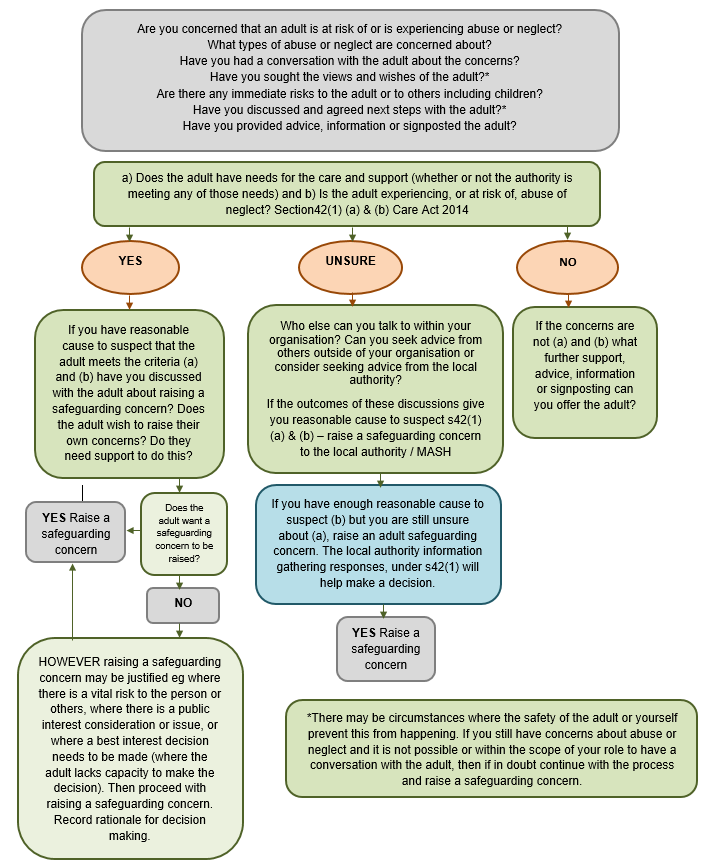
Flowchart B: Managing Safeguarding Concerns Flowchart
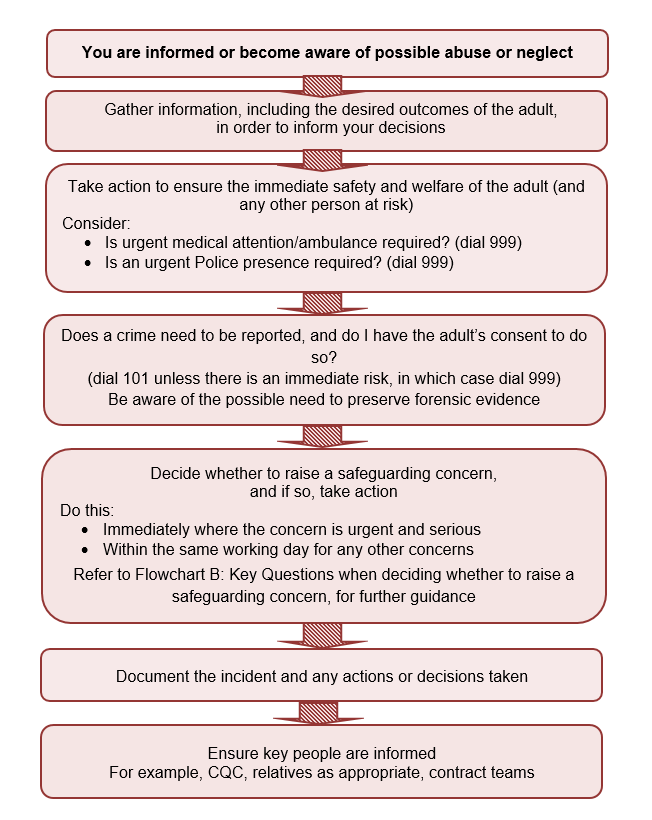
Flowchart C: Key questions when deciding whether to report a safeguarding concern
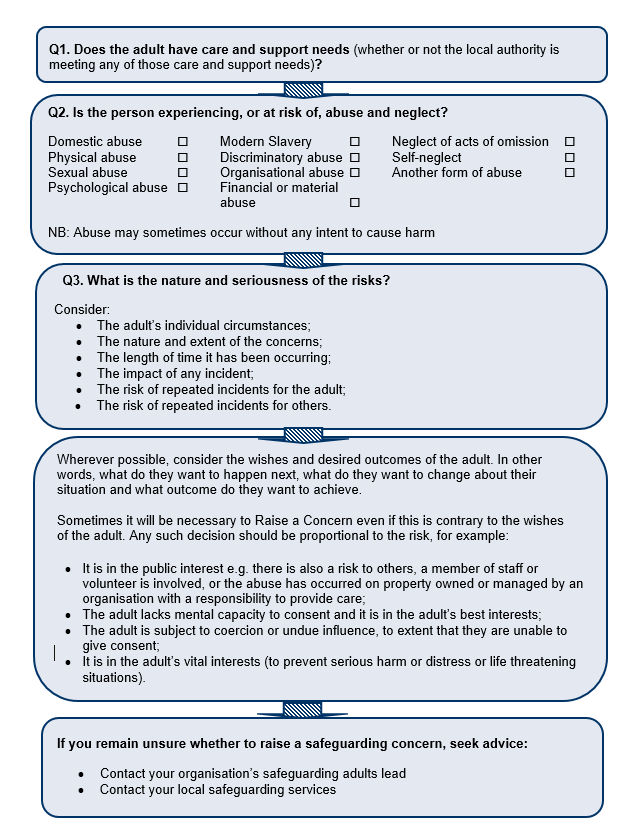
4.8 Gather Information
If you are made aware of safeguarding concerns or allegations, you must take them seriously however trivial they might initially seem.
You may need to gather information in order to decide whether you should raise a safeguarding concern and the most appropriate action to keep the adult safe. This may involve checking relevant records, ascertaining concerns from colleagues, gathering background information, etc.
Gather only the information you need in order to make the decision about whether to raise a safeguarding concern and to keep the adult safe.
Unless it might prejudice a safeguarding enquiry or a Police investigation, the Safeguarding Concerns Manager should speak to the adult to get their views about:
- What has happened;
- What they want to happen now;
- The desired outcomes that the adult wants.
Desired outcomes are those changes that the adult wants to achieve from the support they receive, such as feeling safe at home, access to community facilities, restricted or no contact with certain individuals or pursuing the matter through the criminal justice system.
4.9 Take Action to Ensure the Immediate Safety of the Adult at Risk
The Safeguarding Concerns Manager must consider whether there are any immediate actions they need to take in order to keep the adult, or others, safe from harm.
This involves taking actions in relation to the adult and others, including:
- Making an immediate evaluation of the risk to the adult and others;
- Taking reasonable and practical steps to safeguard the adult as appropriate;
- Liaising with the Police where an immediate Police presence is required or to discuss any risk management issues;
- Arranging any necessary emergency medical treatment; note that offences of a sexual nature will require expert advice from the Police;
- Making sure that other service users are not at risk and if they lack capacity to consent to any proposed arrangements, a decision is made in accordance with their best interests.
It may also involve taking actions in relation to the person or organisation alleged to have caused harm, including:
- Liaising with the Police wherever possible regarding actions that may impact upon a subsequent criminal investigation, such as where the protective arrangements may forewarn the person alleged to have caused harm of an impending criminal investigation, and potentially prejudice the collection of evidence;
- Ensuring that any staff (or volunteers) who have caused harm are not in contact with service users and others who may be at risk, for example, ‘whistle-blowers’.
Note:
- Do not discuss the concern with the person alleged to have caused harm, unless the immediate welfare of the adult or other people makes this unavoidable;
- If the person alleged to have caused harm is a member of staff and an immediate decision is required to suspend them, the person has a right to know in broad terms what allegations or concerns have been made about them. Care however should be undertaken not to jeopardise any resulting Police investigation or Enquiry;
- If the allegation involves agency staff, the agency should also be notified of the safeguarding concern having been raised;
- If the person alleged to have caused harm is another service user, action taken may include removing them from contact with the adult. In this situation, arrangements must be put in place to ensure that the needs of the person alleged to have caused harm are also met.
4.10 Deciding Whether to Report an Incident to the Police
If a crime has been, or may have been committed, seek the person’s consent to report the matter immediately to the Police.
If the person has mental capacity in relation to the decision and does not want a report made, this should be respected unless there are justifiable reasons to act contrary to their wishes, such as:
- The person is subject to coercion or undue influence, to the extent that they are unable to give consent; or
- There is an overriding public interest, such as where there is a risk to other people; or
- It is in the person’s vital interests (to prevent serious harm or distress or in life- threatening situations).
There should be clear reasons for overriding the wishes of a person with the mental capacity to decide for themselves. A judgement will be needed that takes into account the particular circumstances.
If the adult does not have mental capacity in relation to this decision, a ‘best interests’ decision will need to be made in line with the Mental Capacity Act.
The Police may also be contacted later, if more information becomes available and it becomes apparent that a crime has been committed.
If the matter is to be reported to the Police, discuss with the Police any risk management issues and any potential forensic considerations.
4.11 Preserving Evidence
Whilst the first concern must be to ensure the safety and wellbeing of the adult, in situations where there may have been a crime and the Police have been called, it is important that forensic and other evidence is preserved. The Police may need to attend the ‘scene’, and agencies and individuals can play an essential part in ensuring that evidence is not contaminated or lost. As far as possible:
- Try not to disturb the scene, clothing or victim if at all possible;
- Secure the scene, for example, lock the door, if possible;
- Preserve all containers, documents, locations, etc.;
- Evidence may be present even if you cannot actually see anything;
- If in doubt, contact the Police and ask for advice.
The Police should be contacted for advice wherever required.
4.12 Deciding Whether to Raise a Safeguarding Concern
In deciding whether to raise a safeguarding concern, refer to Flowchart C: ‘Key questions when deciding whether to raise a Safeguarding Concern’
Consider the following questions:
- Is the person an ‘adult at risk’ as defined within this policy and procedures?
- Is the person experiencing, or at risk of, abuse and neglect?
- What is the nature and seriousness of the risk?
- What does the adult want to happen now?
The adult should experience the safeguarding process as empowering and supportive. Practitioners should seek to agree actions with the adult, taking into consideration their desired outcomes of any support provided.
Desired outcomes are those changes that the adult wants to achieve from the support they receive, such as feeling safe at home, access to community facilities, restricted or no contact with certain individuals or pursuing the matter through the criminal justice system.
Consent should be sought where possible. There may be circumstances where consent cannot be obtained because the adult lacks the capacity to give it or is subject to coercion or undue influence. There will also be occasions where action may need to be taken if others are or will be put at risk if nothing is done, or where it is in the wider public interest for action to be taken. For further guidance refer to Section 3.5
There may be some occasions when the adult does not want to pursue a referral to the local authority. Where it is a personal matter and may cause family disharmony, if possible the adult’s wishes should be respected and other ways of ensuring the adult’s safety explored. Where there is a potentially high risk situation, staff should be vigilant of possible coercion and the emotional or psychological impact that the abuse may have had on the adult.
Where required, take advice from your safeguarding adults lead for your organisation.
4.13 Mental Capacity to Consent
The law (Mental Capacity Act 2005) presumes that adults have mental capacity to make their own decisions. However there will be times and situations in which an individual lacks capacity.
In deciding whether the adult has mental capacity to consent to a concern being raised, consider if the adult has mental capacity to make informed decisions:
- About other people being informed?
- About actions which may be taken under this policy and procedures?
- About their own safety, including an understanding of longer-term harm as well as immediate effects? and
- How to take action to protect themselves from future harm?
If the adult has mental capacity to decide about Raising a Safeguarding Concern their consent should be sought, unless to do so may place a person at risk or it is not possible to seek that person’s consent.
The two stage test of mental capacity is:
- Is there an impairment of, or disturbance in, the functioning of the person’s mind or brain?
- If so, is the impairment or disturbance sufficient that the person lacks the mental capacity to make this decision at this time?
A person is unable to make that decision if he/she is unable to:
- Understand the information relevant to the decision;
- Retain that information (for as long as required to make the decision);
- Use or weigh that information as part of the process of making the decision;
- Communicate their decision (whether by talking, sign language or any other means).
If the adult is assessed as not having mental capacity to decide whether a safeguarding concern should be raised, the decision must be made in their ‘best interests’ in line with the Mental Capacity Act, 2005.
For further information see Section 3 of this policy and procedures.
4.14 Raising a Safeguarding Concern without the Consent of the Adult at Risk
Practitioners should wherever possible seek the consent of the adult before taking action, taking into consideration their wishes and desired outcomes as outlined in Section 5.1 However, whilst consent is an important consideration, it is not the only consideration.
The following are examples of when a decision to raise a safeguarding concern may still be appropriate, even without the consent of the adult:
- It is in the public interest, for example,
- There is a risk to other ‘adults at risk’; or
- The concern is about organisational or systemic abuse; or
- The concern or allegation of abuse relates to the conduct of an employee or volunteer within an organisation providing services to adults at risk; or
- The abuse or neglect has occurred on property owned or managed by an organisation with a responsibility to provide care.
- The adult lacks mental capacity to consent and a decision is made to raise a safeguarding concern in the adult’s ‘best interests’ (Mental Capacity Act 2005);
- An adult is subject to coercion or undue influence, to the extent that they are unable to give consent;
- It is in the adult’s vital interests (to prevent serious harm or distress or in life- threatening situations).
Any actions taken without the consent of the adult should be proportionate to the risk of harm. The adult should ordinarily be informed of the actions being taken, unless to do so may place the adult or others at further risk of harm.
4.15 Document the Incident and any Actions or Decisions Taken
Ensure all actions and decisions are fully recorded. It is possible that your records may be required as part of a Police investigation or Enquiry. Be as clear and accurate as you can. Record the information about the concern/allegations, your decisions and any advice given to, or by, you in making these decisions.
Ensure that appropriate records are maintained, including details of:
- The nature of the safeguarding concern/allegation;
- The wishes and desired outcomes of the adult;
- The support and information provided to enable the adult to make an informed decision;
- Assessments of mental capacity, where indicated;
- The decision of the organisation to raise a safeguarding concern (or not).
4.16 Ensure Key People are Informed
Where relevant, the Safeguarding Concerns Manager should inform:
- The Care Quality Commission if the concerns involve a regulated service provider;
- The Charity Commission if the concern involves a registered charity;
- The commissioners’ department for the adult (where relevant);
- Child protection services, if children are also at risk from harm;
- Relatives of the adult according to their consent, or in their ‘best interests’ where they lack the mental capacity to make this decision for themselves;
- Their line manager (and safeguarding adults lead if different) of their decisions and actions in line with this policy and procedures);
- Their Human Resources Manager if allegations/concerns relate to a member of staff;
- Staff delivering a service on a need-to-know basis so that they do not take actions that may prejudice an Enquiry, or increase the risk to any person.
As well as deciding whether or not to Raise a Safeguarding Concern, the Safeguarding Concerns Manager must also decide whether to follow other relevant organisational reporting procedures. For example, NHS organisations may need to report under clinical governance or the Serious Incident Framework.
4.17 Provide Support for the Person Raising the Concern
Incidents of alleged or actual abuse can be very distressing. People who have witnessed abuse or had abuse disclosed to them may need support in their own right. Managers are responsible for:
- Supporting any member of staff or volunteer who identified the concern;
- Enabling and supporting relevant staff to play an active part in the safeguarding adults procedure.
4.18 Issues and Concerns regarding Service Provision
Some local authorities have provided service providers with guidance regarding when an issue involving their service provision should be reported to the local authority and when local action by the provider is all that is required. This guidance is often themed around the high volume types of issues which arise such as medication errors, resident on resident issues, trips and falls and pressure ulcers. These incidents are mainly at the lower level of harm without intent and could be seen as quality of service issues. Each local authority in the combined area will offer its own advice to service providers on what should be reported.
Decisions to raise concerns with the local authority which do not involve service provision need to take into account all relevant information that is available, including the views of the adult in all circumstances where it is possible and safe to seek their views. If the adult does not want to pursue matters through safeguarding action, staff should be sure that the adult is fully aware of the consequences of their decisions, and that all options have been explored and that not proceeding further is consistent with legal duties. Please see 3.5: Reasons to override consent.
4.19 How to Raise a Safeguarding Concern
A safeguarding concern can be raised by anyone who has a concern about an adult.
The concerns should be reported to the safeguarding contact point in the local authority area where the abuse has occurred. See Appendix 3 for information you will be asked to provide.
Safeguarding adult contact points can be found here.



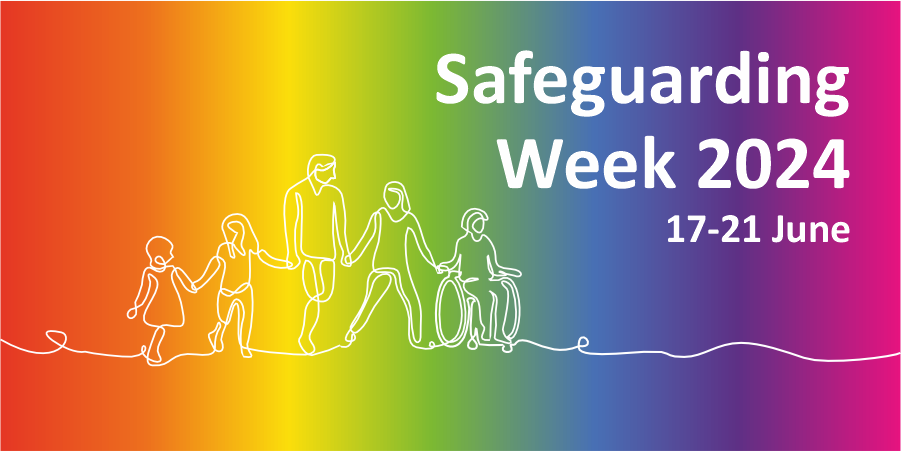

 View all our news
View all our news